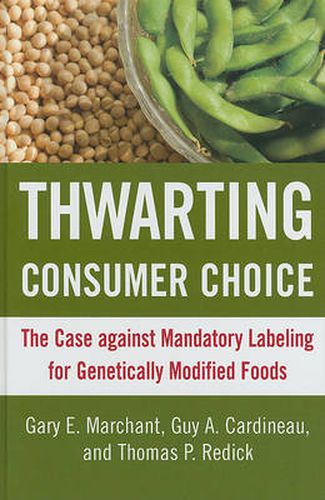Readings Newsletter
Become a Readings Member to make your shopping experience even easier.
Sign in or sign up for free!
You’re not far away from qualifying for FREE standard shipping within Australia
You’ve qualified for FREE standard shipping within Australia
The cart is loading…






Are consumers entitled to full disclosure about what is in their food? Many countries, including key U.S. trading partners in Europe and Asia, have adopted mandatory labeling laws for genetically modified crops such as corn and soybeans. Policymakers in the United States are under pressure from activist groups to adopt similar laws, and some public opinion polls suggest that 90 percent of Americans support mandatory GM labeling. But does GM labeling really protect consumers? In Thwarting Consumer Choice, Gary E. Marchant, Guy A. Cardineau, and Thomas P. Redick contend that mandatory GM labeling laws actually harm consumers by pushing genetically modified foods off the market. Although proponents of mandatory labeling often question the safety of genetically modified foods, the National Academy of Sciences and other leading research institutions agree that GM foods present no unique risks, or greater risks than non-GM foods. Genetically modified foods are not only safe, but abundant and inexpensive. Because they require less use of pesticides and fewer acres of land than conventional crops, they do not overtax the environment. Future innovations could produce GM foods with increased vitamin levels and reduced fat content.
Despite these vast benefits, the GM food industry is threatened by labeling requirements that are burdensome, expensive, and stigmatizing. Mandatory labeling would deter investment in this burgeoning biotechnology and deprive the public of important innovations. Ultimately, the authors conclude, GM labeling laws are antithetical to the notion of consumer choice.
$9.00 standard shipping within Australia
FREE standard shipping within Australia for orders over $100.00
Express & International shipping calculated at checkout
Are consumers entitled to full disclosure about what is in their food? Many countries, including key U.S. trading partners in Europe and Asia, have adopted mandatory labeling laws for genetically modified crops such as corn and soybeans. Policymakers in the United States are under pressure from activist groups to adopt similar laws, and some public opinion polls suggest that 90 percent of Americans support mandatory GM labeling. But does GM labeling really protect consumers? In Thwarting Consumer Choice, Gary E. Marchant, Guy A. Cardineau, and Thomas P. Redick contend that mandatory GM labeling laws actually harm consumers by pushing genetically modified foods off the market. Although proponents of mandatory labeling often question the safety of genetically modified foods, the National Academy of Sciences and other leading research institutions agree that GM foods present no unique risks, or greater risks than non-GM foods. Genetically modified foods are not only safe, but abundant and inexpensive. Because they require less use of pesticides and fewer acres of land than conventional crops, they do not overtax the environment. Future innovations could produce GM foods with increased vitamin levels and reduced fat content.
Despite these vast benefits, the GM food industry is threatened by labeling requirements that are burdensome, expensive, and stigmatizing. Mandatory labeling would deter investment in this burgeoning biotechnology and deprive the public of important innovations. Ultimately, the authors conclude, GM labeling laws are antithetical to the notion of consumer choice.